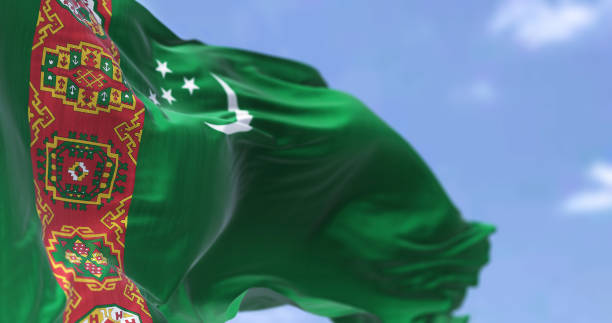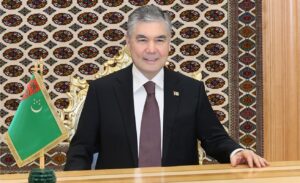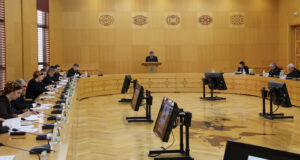Geo-Strategic Importance of Turkmenistan: An Analysis

Turkmenistan is bordered by Uzbekistan to the north and east, Kazakhstan to the northwest, Afghanistan to the southeast, Iran to the south and the Caspian Sea to the west. Natural gas rich but impartial Turkmenistan has its importance in Central Asian region because of its strategic position, ample natural energy resources, and neutral foreign policy. This article also highlights Turkmenistan’s position at the center of power politics particularly in relation to Europe, China, and Russia as Geo-strategical it stands at most important juncture of development trajectory and trade routes that is a bridge between big powers for regional and economic cooperation. According to observers of World Trade Organization (WTO), its international standing further provides trade relaxation and economic diversification.
Introduction:
Turkmenistan, one of the five Central Asian republics, is home to the world’s total 7% reserves of natural gas, which has positioned it at the center of power politics particularly in relation to Europe, China, and Russia. The invention of most important fuel fields, which includes Galkynysh known as Lolotan gas field, one of the international biggest underscores of Turkmenistan’s importance in the worldwide strength landscape.
Similarly to its strength and wealth, Turkmenistan’s strategic location on the Caspian Sea gives it access to crucial maritime routes that connect Central Asia with the South Caucasus and beyond to Europe. The Caspian Sea is an important region for nearby change and energy transportation and Turkmenistan’s port metropolis of Turkmenbashi plays a key position in facilitating alternate across the Caspian area. The improvement of transportation and power corridors, consisting of proposed Trans-Caspian pipelines, in addition highlights Turkmenistan’s ability as a important link in Eurasian infrastructure networks.
One of the maximum distinctive capabilities of Turkmenistan’s overseas policy is a permanently impartial and this neutrality allows Turkmenistan to keep away from entanglement in nearby conflicts and military alliances, allowing it to hold diplomatic members of the family with an extensive variety of countries, from Russia and China to the USA and European Union. This impartial stance has additionally positioned it as a mediator in regional disputes, mainly the ones associated with water sources and electricity distribution in Central Asia. It makes a specialty of preserving stability within the area, particularly regarding its southern neighbor, Afghanistan. Turkmenistan has played a quiet but important function in providing humanitarian help and facilitating speak between Afghan factions, as it has 744 kilometer-lengthy border with Afghanistan which is essential for regional stability and peace.
However, Turkmenistan’s geographical position and large natural fuel reserves make it a vital participant in the geopolitics of Central Asia. As global powers like China, Russia, and the European Union compete for influence within the area, Turkmenistan will keep playing a crucial position in shaping the dynamics of strength politics, regional stability, and economic development. Its strategic selections regarding power exports, local cooperation and retaining its neutrality can have long-lasting implications for the future of Central Asia and its relationship with the wider world.
Geo-Strategic Importance of Turkmenistan:
Turkmenistan performs a key position in selling regional cooperation in Central Asia. Its policy of everlasting neutrality, Turkmenistan actively participates in various regional initiatives geared toward boosting connectivity. One of the most big tasks is the Turkmenistan-Afghanistan-Pakistan-India (TAPI) pipeline, which will deliver 33(BCM) of natural gas annually from Turkmenistan to South Asia, promoting cooperation across the region. Further to electricity, Turkmenistan is engaged in several infrastructure tasks to beautify nearby connectivity. Turkmenistan is a player in China’s Belt and road Initiative (BRI), with the Turkmenbashi global Seaport on the Caspian Sea serving as a key hub for change routes linking valuable Asia, the Middle East, and Europe. This enhances Turkmenistan’s role as a transitory between East and West.
Turkmenistan also contributes to multilateral businesses, inclusive of the ECO (Economic Cooperation Organization) and CAREC (Central Asia Regional Economic Cooperation Program), which intends to financial collaboration among member states. with these structures, Turkmenistan works on issues like change facilitation, shipping infrastructure, and strength cooperation, underscoring its commitment to nearby integration notwithstanding its neutral foreign policy. Even as Turkmenistan maintains its impartial stance in politics, its regional cooperation efforts are targeted on bolstering financial development and connectivity.
China is one of the most important player in the region through its Belt and road Initiative (BRI). Central Asia is a vital place for China’s aim of connecting markets in Europe, the Middle East and Asia. China has invested closely in infrastructure and strength initiatives, which includes the Turkmenistan-China gasoline pipeline, which components 40(BCM) of gasoline annually, making Turkmenistan a key electricity exporter to China. According to a newspaper named Turkmenistan Golden Age, Turkmenistan and China have cooperated in various fields over the 31 years since the establishment of politic relations. The current relations between the two countries are broad and have reached the level of a comprehensive strategic partnership.
Geo-strategically, the importance of Turkmenistan in Central Asia in recent times is a result of the considerable natural sources, strategic positioning, fair foreign policy, and its changing function from regional and international dynamics with the fourth- biggest herbal gasoline reserves globally, Turkmenistan brings significant electricity and wealth to make certain strength protection inside the location. Conferred the principle of “permanent neutrality” Turkmenistan maintains balanced relations with foremost powers such as Russia, China, and the USA.
Turkmen President Berdimuhamedov’s slogan of “Dialogue: A guarantee of Peace” reflects the state’s commitment of mutual respect. This would make Turkmenistan free from regional conflicts and military alliances, making it appear strong in a very risky vicinity in future.


